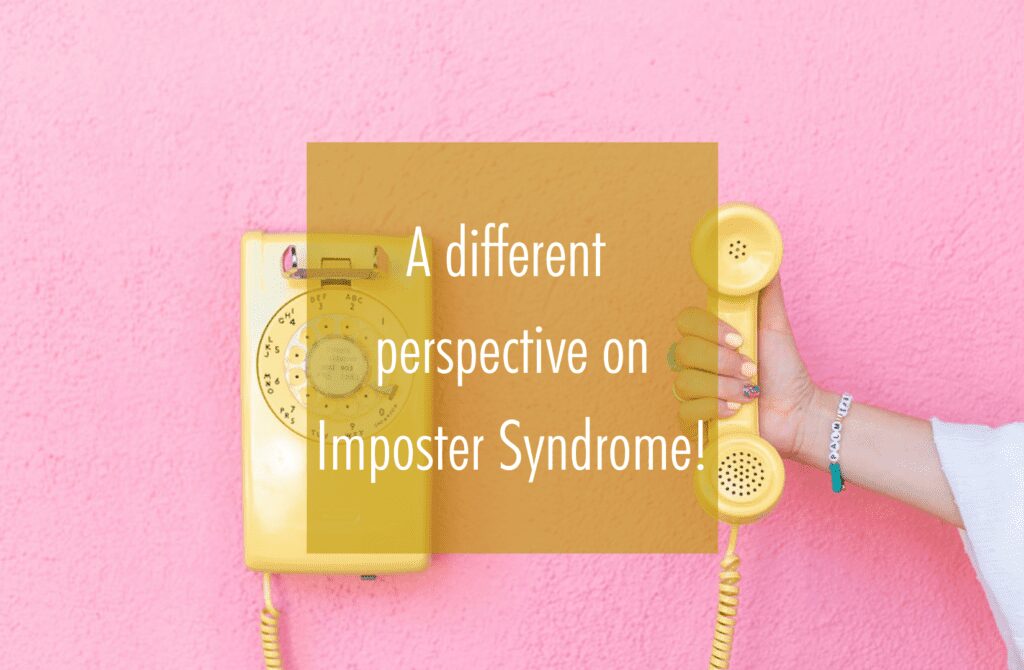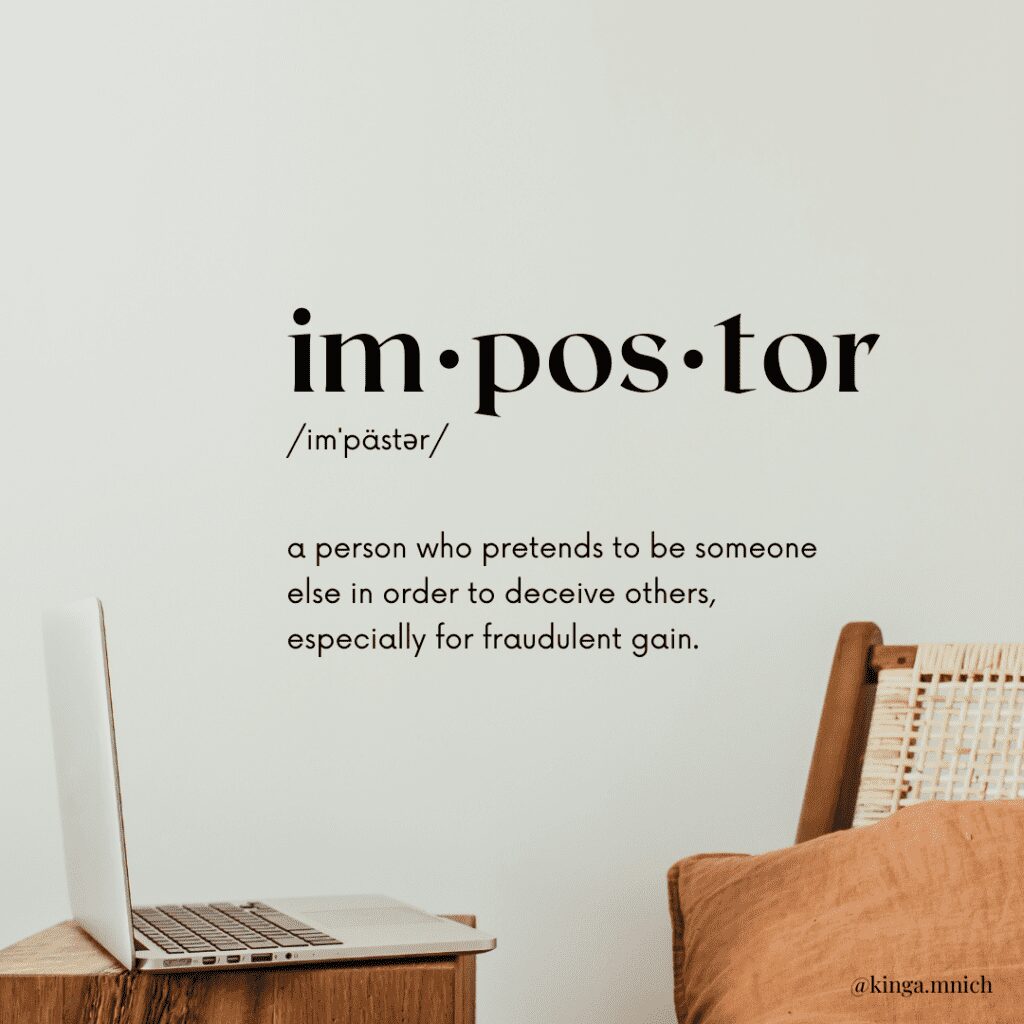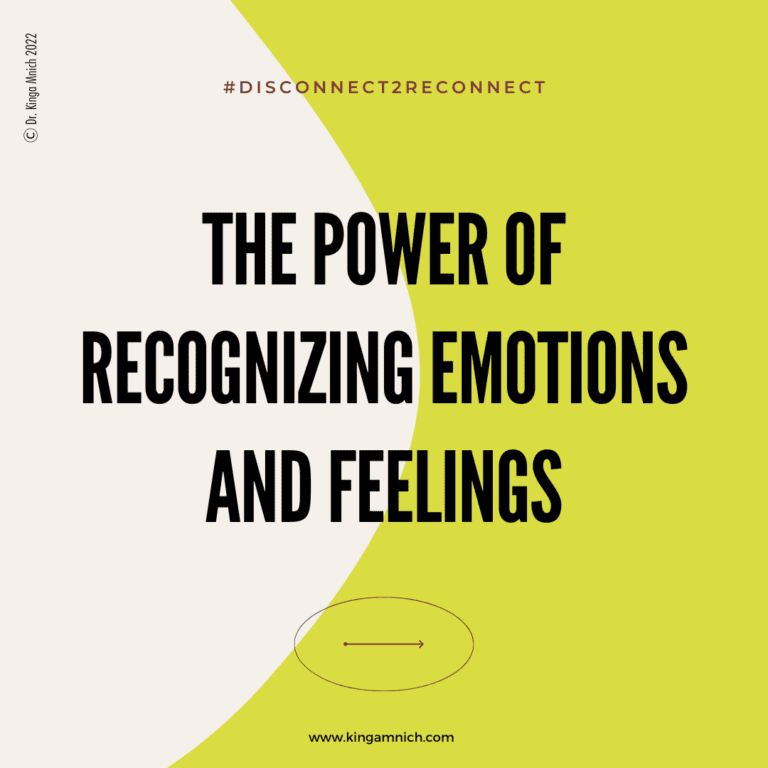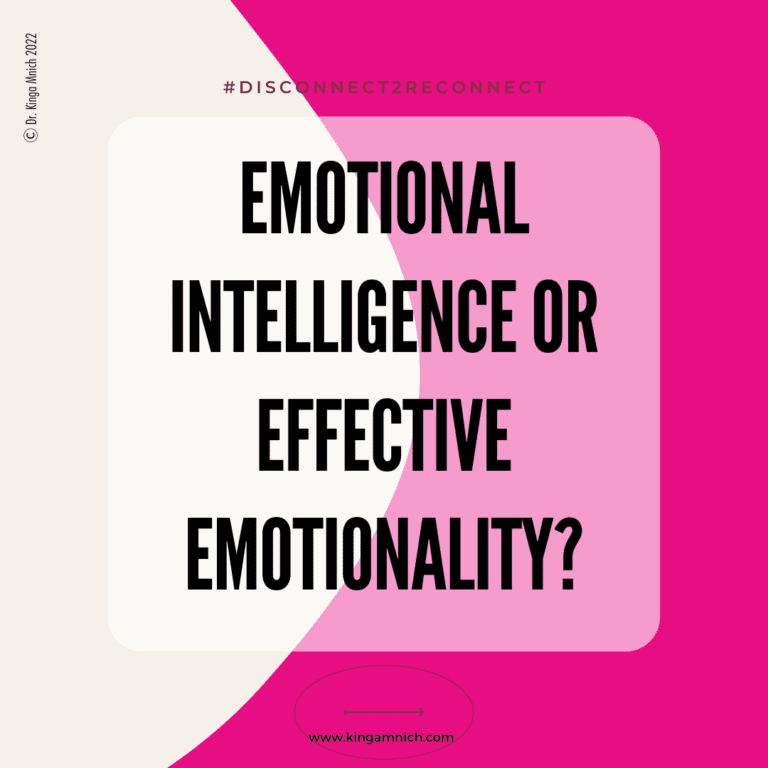Imposter syndrome is a widely discussed topic, and there are many different definitions of imposter syndrome. Which, of course, can be confusing. The second question usually is how to overcome the imposter syndrome.
Imposter syndrome is generally understood as the fear of being uncovered as a fraud because you feel like you are not good enough, don’t belong into a specific circle, feel like you don’t have the necessary knowledge or experience needed that others know more than you do. But if you look up the definition of imposter syndrome and break it apart, you might be surprised that the oxford dictionary defines it as a person who pretends to be someone else to deceive others, especially for fraudulent gain.
In this article, I will discuss the history of this phenomenon, its different types, and the different perspectives. Also, I am going to introduce a different perspective on imposter syndrome: The danger of having mainstream use it as a term. And I will propose a simplified way of dealing with different kinds of imposter syndrome.
Story of the Imposter Syndrome
Pauline Rose Clance and Suzanne Imes came up with the term “imposter phenomenon” in 1978 and embedded it into American psychology on the premise that women were less likely to internalize success. They found this phenomenon in high-achievers and people that excelled in their field – nevertheless consistently felt like a fraud or inadequate despite contrary evidence.
The term is not an official psychological diagnosis or illness that can be treated. There are no official treatment suggestions. Instead -and unfortunately-, it is a term that has found its way into media predominantly in the last two years (see Prevalence, Predictors, and Treatment of Impostor Syndrome: a Systematic Review)—allowing self-announced gurus to diagnose clients with the so-called imposter syndrome. Quite often mixing psychosocial phenomena and offering a step-by-step guide to dissolving the syndrome.
The imposter syndrome has a wide range of symptoms, and Dr. Clance has developed a scale categorizing the syndrome.
Symptoms of Imposter Syndrome
According to Dr. Clance’s imposter phenomenon scale, the phenomenon can include:
- Disappointed over current accomplishments
- Doubtful of successes
- Constant pressure to achieve or be better than before
- Stressed, anxious, or depressed from feelings of inadequacy
- Like success is impossible
- Incompetent despite demonstrating competency.
- Incapable of performing at the same level every time
- Uncomfortable with receiving praise or congratulations
- Like past successes only happened due to luck, not hard work.
And it can also include fear of not meeting another person’s expectations.
Who can experience the Imposter Syndrome?
The imposter syndrome can generally be experienced by anyone. Some research has even shown that women and men are equally affected by it. But on the contrary to what is circulating on Social Media, the chances to experience the imposter syndrome increase with experience. Meaning, the more you know the higher are the chances that you will doubt your knowledge. Therefore the imposter phenomenon can be seen as the opposite of the Dunning-Kruger effect. This shows that in some cases people that don’t know what they don’t know portray over-confidence and self-assurance without having the experience or knowledge on a topic (But be aware, you will also find stats and research that will contradict this phenomenon. Unfortunately, some terms have been hijacked by the prevailing online-marketing movement).
So, what is the Imposter Syndrome?
The latest articles are discussing Imposter Syndrome from a different perspective including the impact of systemic racism, classism, xenophobia, and other biases. These were categorically absent when the concept of imposter syndrome was developed. Bringing a different dimension to the table. Let’s look at the definition of imposter for a moment. According to the oxford dictionary, an imposter is a person who pretends to be someone else in order to deceive others, especially for fraudulent gain. The last part of this definition is already pointing to the discrepancy in how the terminology is being used.
Just because you are afraid of not being able to perform a task or feel like others know more and they will discover that you don’t, does not mean that you are suffering under the imposter syndrome but rather lack of confidence, which is the belief and knowledge that you will be able to perform and succeed.
A more accurate description of an imposter would be if you feel like you don’t belong inside a specific group or circle; Someone that is pretending to be someone else. But again this would have to be connected to feeling like you are pretending because you are seeking personal gain. In most instances, my clients are afraid of speaking in front of other people, and feel insecure because they are stepping on undiscovered territory or pushing their own boundaries of comfort. Calling this an imposter syndrome brings a heaviness to the topic that can be resolved with simple steps. This unnecessary labeling can subconsciously induce the feeling of imposing, feeling like a liar or fraud.
Why we need to stop using the term Imposter Syndrome?
Unfortunately, labeling is not going to resolve negative feelings or the experience of fear. It places a grey dome all over your head and makes you feel like you have a significant problem that needs to be resolved. But because of the sound of it, it will take you years to dissolve the issue. Imposter syndrome sounds heavy.
The Harvard business review brings another spin on the topic: Usually, we experience the “imposter syndrome” in specific professional environments, that make us feel like we don’t belong there. It doesn’t account for the historical or cultural context. Instead of changing the environment that is causing it, we are trying to fix the people that are experiencing it.
Emotions are dynamic and evolve. But if we don’t step aside and take a break, we don’t give ourselves the chance to see a different side to the story. Instead we look for a quick diagnosis so we can explain what’s happening.
Unfortunately, the imposter syndrome is a quick label that sticks easily and prevents many from diving into their emotional make-up, their emotional understanding, and pre-set structures that are hindering us from living freely and being successful on our own terms.
Defining success?
Let’s break down success for a moment; The feeling of being afraid of performing in tasks that are necessary or crucial for your success is holding us back. Here is the good news: Obviously you have placed yourself in a situation in which you are being challenged. That means that you want to grow. You want more for yourself. Feeling afraid of new situations, new tasks and new people is natural. Our brain automatically labels unknown situations as potential danger. Until you push through that feeling and start accepting it as part of the journey, you will always feel intimidated and inadequate.
Your personal definition of success plays a significant role within that process. What does success mean to you and what do you need to do in order to feel successful? Defining the steps that you need to take will help you stay motivated and allow you to define goals based on your own values.
This is for many the breaking point. Reckoning, trampoline, transformation, changing, transitional)
A different take on Imposter Syndrome
Maybe it is time to re-define the meaning of imposter syndrome and instead of seeing it as a syndrome, an illness, and malfunction of the brain, as some suggest. What if the imposter syndrome is actually the feeling that you are off track? That you are not working in line with your vision for life. What if you are feeling like an imposter because you are not using your signature strength, neither are you doing work based on your own values?. Maybe it is time to redefine the imposter syndrome into the “imposter emotion” or emotional concept. Rather than speaking of imposter syndrome when you are experiencing insecurities or fear, allow yourself to understand where this feeling is coming from and stop judging yourself for feeling it. Instead, become an observer. Don’t label it.
But if you rule out fear of the unknown or fear of performing or any other fear, consider the fact that your internal compass is telling you that you are not on the right track. It takes courage to do that. Being honest with yourself and admitting that you might have been trying to copy the path of others, or have been motivated by the wrong emotions is a courageous act. It takes willpower and determination to correct your course of action.
The power of emotions and the power of feeling the “Imposter Emotion”
The biggest obstacle in understanding your inner compass is stop being afraid of your emotions and stop judging yourself for feeling certain emotions. There are no inappropriate emotions. There are just emotions. Emotions tell us how we feel within ourselves and within the context of a situation. They help us to understand if we are aligned ethically and how we are connected to the people around us. Emotions are not just individual experiences. They happen within interactions and are reactions to what is happening around you.
Feeling like you don’t want to be in a situation can easily be confused with feeling like you don’t belong there. Understanding the subtle difference of your emotions is what is going to help you be successful and live a life based on your own terms.
7 steps to develop a better relationship with your emotions
- Stop judging yourself, your thoughts, and feelings
- Take a step back and become an observer of your emotions
- Start an emotion journal: Documenting what you are feeling on a daily basis and comparing.
- Allow yourself to take a step back and become an observer
- Recognize the subtle differences between your feelings
- And start taking your power back by deciding which emotions are relevant to you and which ones aren’t
- Reframe the meaning of emotions. Just because you learned that fear is negative doesn’t mean that it is. It can also be a sign of growth and adventure.
The meaning of emotions is individual. We grow through different experiences in life, have different backgrounds, grow up in different cultures, and have different personalities. Therefore there is no right or wrong in experiencing your own emotions. Emotions are dynamic and steer our energy. Connecting on a deeper level with them is what will allow you to take your power back and stand above any kind of syndrome, setback or obstacle.
Don’t get stuck on concepts, labels, or terms that others have created to place you into a box. Break out of the box and allow yourself to explore and be curious. Allow yourself to explore your emotions and reconnect with your understanding of your own emotions. Are you holding emotions that are not yours?
Read more about the topic of Imposter Syndrome:
- The Imposter Phenomenon
- Stop Telling Women They Have Imposter Syndrome
- Prevalence, Predictors, and Treatment of Impostor Syndrome: a Systematic Review
Or check out the upcoming The Ziva Way incubator and stop the non-sense self-talk and step into your full potential.














